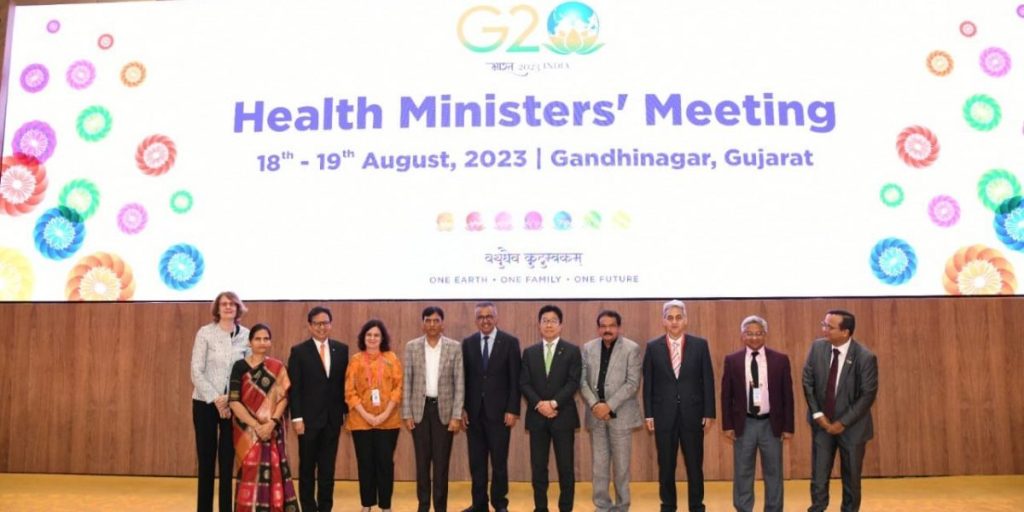By Dr Nitya Mohan Khemka
India, with its rich tapestry of cultures, languages, and religions, offers an intricate mosaic of development challenges and opportunities. As the world’s largest democracy and most populous country, achieving inclusive development is pivotal to ensuring sustained socio-economic growth. This article delves into India’s pursuit of inclusive development with a focus on the crucial sectors of education and healthcare, says Dr Nitya Mohan Khemka.
 |
The aspiration towards inclusive development is grounded in South Asian tradition and thought. Mahatma Gandhi’s emphasis on uplifting the village economy as a strategy for development as well as the dangers of unchecked growth and environmental degradation have formed the bedrock of the sustainability movement in much of South Asia. Inclusive development refers to economic growth that extends benefits to the widest range of people, including the marginalized and vulnerable sections of society. It emphasizes equal opportunities in terms of access to markets, resources, and an unbiased regulatory environment. It seeks to reduce inequalities, foster social harmony, and ensure that no one is left behind in the process of development. This is consistent with Prime Minister Modi’s credo of “SabkaSaath, SabkaVikas, SabkaVishwas” (Participation of All, Development for All, Trust for All).
Synergies between Health and Education
For inclusive development, education and healthcare must be viewed synergistically. Better education leads to improved health outcomes, as educated individuals are more likely to understand and access healthcare services. Conversely, a healthy population is better able to participate in and benefit from educational opportunities. Programs that address health and nutrition of school-going children, such as the Midday Meal Scheme, which is a multi-faceted programme of the Government of India that seeks to tackle issues of food security, lack of nutrition, and access to education on a nationwide scale, exemplifies this synergy.

Role of Education
India has made significant progress in improving access to quality education, increasing school enrollment, and reducing the number of out-of-school children. These achievements have been strengthened by key legislations, policies, and schemes such as the Right of Children to Free and Compulsory Education (RTE) Act (2009) which mandates eight years of quality education for all children aged 6-14; the SarvaShikshaAbhiyan (SSA) which complements the RTE by aiming to universalize elementary education, bridging social, regional, and gender gaps; the National Early Childhood Care and Education (ECCE) Policy (2013); the RashtriyaUchchatarShikshaAbhiyan (RUSA) which seeks to boost the quality of state institutions; and the National Education Policy (2020), a transformative policy designed to overhaul India’s education system. Recognizing that formal education might not be the only path to employment, India has also emphasized vocational training through schemes like PradhanMantriKaushalVikasYojana (PMKVY). However, while policies abound, the implementation often witnesses disparities. Fragmented service delivery, bureaucratic delays, inadequate infrastructure, and lack of awareness among beneficiaries can impede progress. In education, while enrollment numbers have surged, learning outcomes remain a concern. Teacher absenteeism, outdated curricula, and inadequate infrastructure are critical challenges. Quality of education is also a major issue. Continuous teacher training and a shift towards learning outcomes rather than rote memorization are necessary. Lessons from the pandemic have also shown that making education more accessible through online platforms and digital tools can help advance learning outcomes and bridge the rural-urban divide.

Healthcare: Sustained Inclusive Development

India’s healthcare system is characterized by a vast network of health facilities. Recent policy interventions have been focused on trying to improve the accessibility, affordability, and quality of healthcare services, particularly in rural areas. These include the National Health Mission (NHM) which aims to improve healthcare services by focusing on 18 states that have poor public health indicators and/or weak infrastructure; the Ayushman Bharat Scheme (2018), an ambitious initiative that aims to provide free healthcare coverage to over 500 million people, making it the world’s largest government-sponsored healthcare scheme; the PradhanMantri Jan ArogyaYojana (PMJAY) which provides insurance cover for over 100 million vulnerable families; the JananiSurakshaYojana (JSY) which incentivizes institutional deliveries; and the Integrated Child Development Services (ICDS) program that focuses on holistic child development. These policies have contributed a great deal towards improving the inclusivity of healthcare delivery in India. There are several challenges remaining with the delivery of healthcare. For instance, while insurance schemes have expanded access, quality of care can vary. Overburdened public health systems, lack of specialists in rural areas, and out-of-pocket expenditures remain pressing issues. The shortage of trained healthcare professionals is a major challenge. Incentivizing medical education and facilitating the deployment of healthcare workers in underserved areas is essential.
Lessons for the World
India assumed the year-long presidency of G20 in December 2022. Under India’s G20 presidency, there has been a significant emphasis to push for inclusive development as a cornerstone of the global agenda. Given the complex and interconnected challenges facing the world today—from economic inequality to climate change—leading such an influential group of countries has offered India a platform to drive meaningful change. India has vast experience in addressing challenges of poverty, innovation, and sustainability, and as G20 Member States position themselves to tackle these urgent issues at the G20 Summit in New Delhi in September 2023, India can leverage its own experience to promote inclusive development in various ways.
In the field of health, with respect to global health security, in the wake of the COVID-19 pandemic, India has been leading discussions and actions to strengthen global preparedness for future pandemics, emphasizing the importance of healthcare infrastructure and rapid response systems. It has used the platform to improve international cooperation for future pandemic preparedness, including vaccine development, manufacturing and distribution. India has also made strides in providing affordable healthcare solutions and can bring this experience to the G20 table. The country’s pharmaceutical sector has also been a major global player, providing affordable medications and vaccines. India’s emphasis on cost-effective healthcare solutions can provide a blueprint for nations looking to optimize healthcare expenditure without compromising on quality. Finally, leveraging its advancements in digital infrastructure, India is spearheading digital health initiatives that enable telemedicine, healthcare data analytics, and online health services to reach underserved populations.
India has also underscored the importance of inclusive and quality education as a means to foster sustainable development and economic growth. Education is central to the achievement of multiple Sustainable Development Goals (SDGs). India could use its presidency to reiterate the importance of education in meeting these global goals, sharing strategies for effective implementation and monitoring.
With the advent of digital technology in education, India could stress the importance of digital literacy as a fundamental skill and discuss initiatives to provide accessible and affordable digital tools for education. India’s focus on education, epitomized by campaigns like “BetiBachao, BetiPadhao” (Save the Daughter, Educate the Daughter), and innovations like the National Digital Library, offer lessons in using limited resources to achieve expansive goals. Finally, given the changing nature of the global job market, India could promote skill-based education and vocational training as a key agenda item, sharing its own experiences and programs like the Skill India initiative.
Development Journey
India’s socio-economic landscape is diverse and complex, but the country’s commitment to inclusive development, especially in education and healthcare, is unwavering. The recent policy initiatives in India show a strong commitment towards achieving inclusive development. However, effective and efficient implementation of these policies is key. This requires relentless political will, increased financial allocations, robust data systems for monitoring progress, and active participation of the civil society in holding the system accountable.
In an increasingly interconnected world, India’s development journey holds lessons for many other nations striving to grow in an inclusive and sustainable manner. Today, as India successfully straddles the intersection of modernity and tradition, poised to become a USD 5 trillion economy, public-private partnerships, technology integration, community involvement, and robust monitoring mechanisms can fast-track the journey towards an inclusive and prosperous India.
While challenges persist, the drive for inclusive development in India—by ensuring equitable access to quality education and healthcare—is a testament to the nation’s vision for a sustainable, equitable and inclusive future. India’s experience and perspectives offer a rich source of insights for global challenges. As a key player in the G20, India not only stands to benefit from international cooperation but also has much to offer in shaping a more equitable and sustainable world order.

Dr Nitya Mohan Khemka is Director, Strategic Initiatives at PATH, a global health think-tank focusing on health equity. Nitya is also a visiting Fellow at Judge Business School at the University of Cambridge where she researches topics spanning gender inequality, poverty, and human development, and lectures on sustainable development and gender. A Fellow Commoner for Clare Hall College, Nitya advises the college on its academic programmes and fundraising strategy. She served as co-chair on the health and gender tracks for the T20, the official academic and policy track for the G20 under India’s presidency. She serves on the Women’s Leadership Board of Harvard’s Kennedy School of Government, supporting the Women and Public Policy Program.
This article has been published in the G20 Summit Edition of India and the World magazine-journal, edited by Manish Chand. To subscribe or buy, write to: in**************@***il.com
Nitya Mohan Khemka
Author Profile
- India Writes Network (www.indiawrites.org) is an emerging think tank and a media-publishing company focused on international affairs & the India Story. Centre for Global India Insights is the research arm of India Writes Network. To subscribe to India and the World, write to editor@indiawrites.org. A venture of TGII Media Private Limited, a leading media, publishing and consultancy company, IWN has carved a niche for balanced and exhaustive reporting and analysis of international affairs. Eminent personalities, politicians, diplomats, authors, strategy gurus and news-makers have contributed to India Writes Network, as also “India and the World,” a magazine focused on global affairs.
Latest entries
 DiplomacyJanuary 5, 2026India walks diplomatic tightrope over US operation in Venezuela
DiplomacyJanuary 5, 2026India walks diplomatic tightrope over US operation in Venezuela India and the WorldNovember 26, 2025G20@20: Africa’s Moment – The Once and Future World Order
India and the WorldNovember 26, 2025G20@20: Africa’s Moment – The Once and Future World Order DiplomacyOctober 4, 2025UNGA Resolution 2758 Must Not Be Distorted, One-China Principle Brooks No Challenge
DiplomacyOctober 4, 2025UNGA Resolution 2758 Must Not Be Distorted, One-China Principle Brooks No Challenge India and the WorldJuly 26, 2025MPs, diplomats laud Operation Sindoor, call for national unity to combat Pakistan-sponsored terror
India and the WorldJuly 26, 2025MPs, diplomats laud Operation Sindoor, call for national unity to combat Pakistan-sponsored terror







